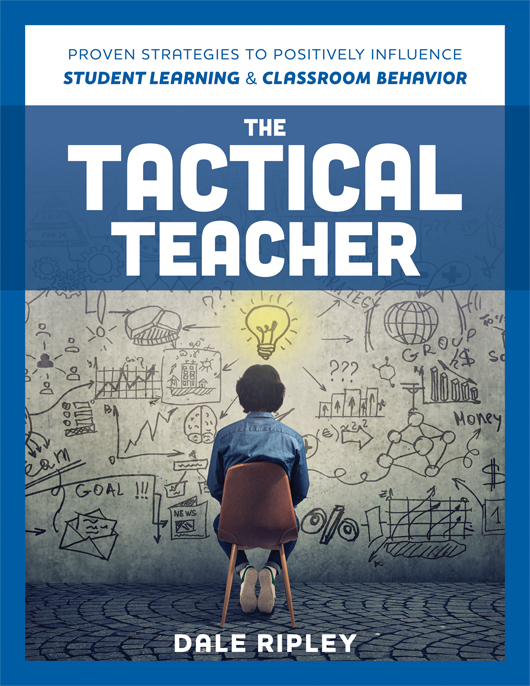Positively influence the behavior of even your most challenging students. In The Tactical Teacher, author Dale Ripley shares a plethora of tactics, ranging from persuasive dialogue to environmental details, proven to improve classroom behavior and increase student learning.
Benefits
- Understand how the experiences of ancient humans still impact student behavior.
- Understand the difference between soft and hard tactics and how to use them effectively.
- Forge positive relationships with even your most challenging or disruptive students.
- Explore the ethics of using specific influence and persuasion strategies in the classroom.
- Help students engage in learning through the tactics portrayed in each chapter.
TABLE OF CONTENTS
Chapter 1: Why Your Students Behave the Way They Do
Chapter 2: Student Behavior Through the Lens of Natural Selection
Chapter 3: Soft Tactics for Helping Your Students Create a Positive Self-Image
Chapter 4: Soft Tactics for Reciprocation
Chapter 5: Soft Tactics for Likability
Chapter 6: Soft Tactics for the Power of Commitment
Chapter 7: Soft Tactics for Making the Invisible Visible
Chapter 8: Soft Tactics for Empathetic Persuasion of Students’ Thinking
Chapter 9: Soft Tactics for Your Classroom’s Physical Environment
Chapter 10: Soft Tactics for Motivating Students by Taking Something Away
Chapter 11: Soft Tactics for Persuading Students With the Right Words
Chapter 12: Soft Tactics for Motivating Students Through Rewards
Chapter 13: Soft Tactics for Making a Great First Impression
Chapter 14: Hard Tactics to Use With Extreme Caution
Chapter 15: Soft Tactics for Knowing When to Influence Your Students
Chapter 16: The Ethics of Influence
Chapter 17: How Your Students might Subconsciously Motivate You
Epilogue
Appendix
PRINTABLE REPRODUCIBLES
Chapter 1
Chapter 2
Chapter 3
Chapter 4
Chapter 5
Chapter 6
Chapter 7
- Figure 7.1: Mark-chart template
- Figure 7.7: Attendance poster template
- Figure 7.8: Examples of student attendance posters
- Reflective Practice
Chapter 8
Chapter 9
Chapter 10
Chapter 11
Chapter 12
Chapter 13
Chapter 14
Chapter 15
Chapter 16
Chapter 17
Appendix
SUGGESTED RESOURCES
BOOKS
- Brendtro, L. K., Brokenleg, M., & Van Bockern, S. (2019). Reclaiming youth at risk: Futures of promise (3rd ed.). Bloomington, IN: Solution Tree Press.
- Colburn, L., & Beggs, L. (2021). The wraparound guide: How to gather student voice, build community partnerships, and cultivate hope. Bloomington, IN: Solution Tree Press.
- Conzemius, A. E., & O’Neill, J. (2014). The handbook for SMART school teams: Revitalizing best practices for collaboration (2nd ed.). Bloomington, IN: Solution Tree Press.
- DuFour, R., DuFour, R., Eaker, R., Many, T. W., & Mattos, M. (2016). Learning by doing: A handbook for Professional Learning Communities at Work (3rd ed.). Bloomington, IN: Solution Tree Press.
- Grafwallner, P. (2021). Not yet . . . and that’s OK: How productive struggle fosters student learning. Bloomington, IN: Solution Tree Press.
- Jensen, E. (2019). Poor students, rich teaching: Seven high-impact mindsets for students from poverty (Rev. ed.). Bloomington, IN: Solution Tree Press.
WEBSITES

